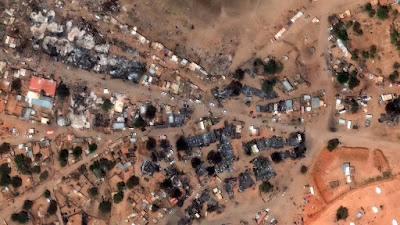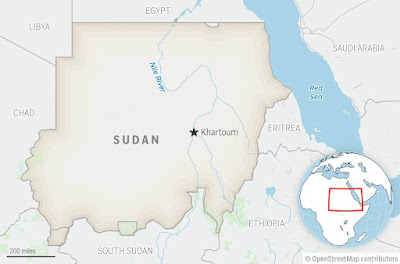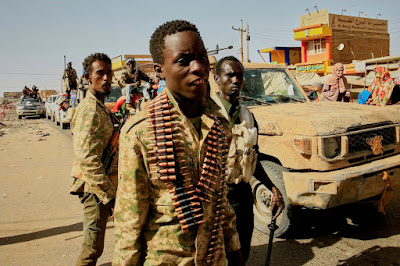"THE Rapid Support Forces (RSF), at war with the regular army since April 2023, launched "coordinated ground and aerial assaults" on Friday on El-Fasher and the Zamzam and Abu Shouk displacement camps, the UN Office for the Coordination of Humanitarian Affairs said.
In recent weeks, the paramilitaries have stepped up their attacks on El-Fasher — the only state capital in Darfur still outside their control — after the army recaptured the national capital Khartoum last month."
Read more in report from FRANCE 24
By FRANCE 24 with AFP
Dated Saturday, 12 April 2025; 22:22 - here is a full copy:
Hundreds feared dead in Sudan as RSF launches attack on famine-hit camps
The United Nations reported on Saturday that more than 100 people, including 20 children, are feared dead after the Rapid Support Forces (RSF) launched attacks on the besieged city of El-Fasher and two nearby displacement camps in Darfur.
 |
This handout image courtesy of Maxar Technologies shows heavy damage at the entrance to the Zamzam camp near North Darfur's besieged capital El-Fasher on February 13, 2025.
© AFP via Maxar Technologies |
More than 100 people, including 20 children, are now feared dead in Sudan following paramilitary attacks on the besieged Darfur city of El-Fasher and two nearby famine-hit camps, the United Nations said on Saturday.
The Rapid Support Forces (RSF), at war with the regular army since April 2023, launched "coordinated ground and aerial assaults" on Friday on El-Fasher and the Zamzam and Abu Shouk displacement camps, the UN Office for the Coordination of Humanitarian Affairs said.
In recent weeks, the paramilitaries have stepped up their attacks on El-Fasher — the only state capital in Darfur still outside their control — after the army recaptured the national capital Khartoum last month.
Early reports from the local resistance committee, a volunteer aid group in El-Fasher, put Friday's death toll at 57, with 32 civilians killed in El-Fasher and 25 in Zamzam.
However, the army said Saturday that 74 civilians were killed and 17 wounded in El-Fasher alone.
Activists said Friday the full extent of the damage in Zamzam remains unclear because of internet shutdowns and communications disruptions.
The Sudanese Organisation for the Protection of Civilians said Saturday the dead included nine humanitarian workers operating a hospital in Zamzam, run by an international non-governmental organisation.
UN Resident and Humanitarian Coordinator in Sudan Clementine Nkweta-Salami condemned their deaths.
"The colleagues from an international non-governmental organisation were killed while operating one of the very few remaining health posts still operational in the camp," she said in a statement.
"This represents yet another deadly and unacceptable escalation in a series of brutal attacks on displaced people and aid workers in Sudan since the onset of this conflict nearly two years ago.
"I strongly urge those committing such acts to immediately desist."
In a statement on Saturday, the RSF dismissed a video purportedly shared by activists showing civilians killed in Zamzam.
The paramilitary group condemned the footage as a fabricated production, labelling it a "desperate attempt to criminalise" its forces.
A local advocacy group, the Darfur General Coordination of Camps for the Displaced and Refugees, said the attack on Zamzam resumed on Saturday morning, with clashes and heavy gunfire heard for hours.
The camp was the first part of Sudan where a UN-backed assessment declared famine last year.
By December, famine had also spread to two nearby camps — Abu Shouk and Al Salam — and is expected to hit El-Fasher itself by May.
The war has killed tens of thousands of people and uprooted more than 12 million since it broke out in April 2023. Both sides in the conflict have been accused of war crimes and breaches of international humanitarian law.
View original: https://www.france24.com/en/africa/20250412-hundreds-feared-dead-in-sudan-as-rsf-launches-attack-on-famine-hit-camps-paramilitary-un
________________________________
Related reports
View original:
https://www.linkedin.com/posts/abdallahhussain3_sudan-news-activity-7317237019854671872-gFS9
_________________
View original:
https://www.linkedin.com/posts/relief-international_relief-international-is-devastated-to-report-activity-7316838235903586304-txhY
_________________
View original:
https://www.linkedin.com/posts/abdallahhussain3_sudan-news-activity-7317225284187922432-xI59
_________________
View original:
https://www.linkedin.com/posts/abdallahhussain3_sudan-news-activity-7316867294666620928-Y7AS
_________________
DTM Sudan Flash Alert - Sunday, 13 April 2025
Um Kadadah (Um Kadadah town), North Darfur
On 10 April 2025, DTM field teams estimated that approximately 3,500 households were displaced from Um Kadadah town of Um Kadadah locality, North Darfur due to clashes between the Rapid Support Forces (RSF) and armed tribal groups. Field teams reported that households were displaced to other locations within Um Kadadah locality, North Darfur. View original with map here.
Al Fasher (Zamzam IDP camp), North Darfur
Between 11 and 12 April 2025, DTM field teams reported the displacement of approximately 3,190 households from Zamzam IDP Camp in Al Fasher locality, North Darfur due to heightened insecurity. Households were displaced to other locations within Al Fasher locality and to locations across Tawila locality in North Darfur. The situation remains tense and unpredictable. View original with map here.
_________________
DTM Sudan Flash Alert - 14 April 2025
Al Fasher (Zamzam IDP camp), North Darfur
Between 13 and 14 April 2025, DTM received multiple reports of large-scale displacement from Zamzam IDP camp. Based on initial estimates, DTM field teams reported that between 60,000 and 80,000 households were displaced from Zamzam IDP camp due to heightened insecurity. The majority of households remain displaced within Al Fasher locality, while others were displaced to locations across Tawila and Dar As Salam localities, North Darfur. These figures represent preliminary estimates only.
View original with map: https://mailchi.mp/iom/dtm-sudan-flash-alert-al-fasher-zamzam-idp-camp-north-darfur-update-077
_________________
Infographic from OCHA - Thursday, 10 April 2025
Sudan: Humanitarian Access Snapshot: Al Fasher and Zamzam (As of 8 April 2025)
https://reliefweb.int/report/sudan/sudan-humanitarian-access-snapshot-al-fasher-and-zamzam-8-april-2025
_________________
Special Report: Friday, 11 April 2025
Confirmation of Ground Assault on Zamzam IDP Camp
https://files-profile.medicine.yale.edu/documents/1c711637-a7c0-4e06-a03b-df4139dbbe78
_________________
Special Report: April 2025 by Prof. Dr. Volker Perthes, Dr. Wibke Hansen
Hunger in Sudan: A Human-Made Catastrophe
Looting, arson, blockades - the warring parties use hunger as a weapon and caused the food system to collapse. In the past two years, the greatest humanitarian crisis the world is experiencing at present developed in Sudan.
https://www.welthungerhilfe.org/global-food-journal/rubrics/crises-humanitarian-aid/hunger-in-sudan-a-man-made-catastrophe
End

.jpeg)
.jpeg)




